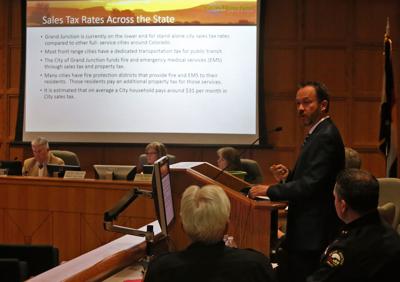City pares tax proposal

With
Grand Junction residents set to consider a 0.39 percent sales tax
increase to fund the construction of a community center, several Grand
Junction City Council members on Wednesday balked at the idea of asking
voters to also consider a 1.25 percent sales tax increase, and
elimination of the city's mill levy, to fund needed improvements for
police, fire and roads.
Instead,
the council will likely pursue separate ballot questions in the
upcoming April election — a 0.5 sales tax increase to fund needed
resources at both the police and fire departments, and a 0.25 sales tax
increase to expand area roadways.
"I
would like to get to a point where we're talking about pushing the (0.5
percent increase for first responders) and the (0.25 percent increase
for roads) … without considering the property tax piece. I think we
leave that one alone," Councilor Chris Kennedy advised. "I think it's a
much better way to talk about all of these measures."
"I think it's confusing to throw that
into a question, when you're looking at, do we need more fire
(investment) and do we need roadway expansion," Councilor Phyllis Norris
said about including the elimination of the city's mill levy.
"As
far as the first responder piece, we don't even have a traffic team out
there. We don't have any of these things because we can't afford it,"
she said.
"Statistics will
drive this, I think, and should carry the day," Councilor Duke Wortman
said. "I'm going to be very much in support of it, and I'll be very
vocal and speaking wherever I need to speak for it. It's about time."
Prior
to discussion of the proposed public safety and infrastructure tax
increase, councilors unanimously agreed to authorize a question on the
upcoming April municipal ballot asking voters to approve a 0.39 sales
and use tax rate increase to fund the construction of a community center
at Matchett Park, develop part of the parkland around the center and
renovate the aging pool facilities on Orchard Mesa.
Also following a unanimous vote
Wednesday, voters additionally will consider a question to allow the
city to sell off what's known as the Burkey Park property at 2982 and
2980 Patterson Road. About 17 acres of that undeveloped park property
was donated to the city by the Burkey family in the late 1960s. While
the Burkeys had envisioned park space for the donated land, money from
the sale of the property should voters approve the measure would be
dedicated to the development and improvement of Matchett Park.
The
city's current sales tax rate is 2.75 percent, and there is no tax on
gasoline, most grocery items, or medicine. General municipal government
services, including police and fire operations, are funded by 2 percent
of that; 0.75 percent is dedicated to city capital projects and economic
development, according to city information.
Grand
Junction residents end up paying just 22 percent of total city sales
taxes, the city says, with Mesa County households outside of the city,
businesses and visitors paying the lion's share, or 78 percent combined.
The
Mesa County sales tax rate is 2 percent, and the city receives a
portion of that revenue. The county also has a 0.37 percent public
safety tax, approved by voters in November 2017. With the addition of
the 2.9 percent state sales tax, the current combined sales tax in Grand
Junction is 8.02 percent.
While the city receives about $500,000
annually from the county public safety tax, that money is used to partly
fund operations at the Grand Junction Regional Communication Center,
which falls under the umbrella of the Grand Junction Police Department.
The money is a far cry from what's needed to bring the police department
up to speed, according to city officials.
To
start, the department is understaffed by an estimated 18 sworn
officers, and an analysis in November showed that current officers were
operating with just 10 percent of their daily shift available for
proactive police activities, well below the 37 percent industry
recommendation. There's an immediate need for 13 new civilian positions
as well, according to police.
The Grand Junction Fire Department needs $6.3 million annually to staff three new fire stations and add three new positions.
In
reality, the three additional stations were identified as "immediate
needs" in 2008 following a third-party study. Since 2008, the city has
grown by about 6,500 people, while total responses increased by 71
percent, according to city information.
Both fire and police said citizens would
be looking at a reduction in services if they don't get the additional
resources they need. For fire, that means already tardy response times
are likely to remain so. For police, that might mean more online
reporting of crimes, and a reduction in the activity of the city's
Street Crimes Unit, among other impacts.
The
city has also identified an estimated $184 million in area roadway
expansion projects that revenues from the tax increase might fund. Key
projects identified include a new interchange at Interstate 70 and 29
Road, widening 24 Road, creating an F 1/2 Road Parkway, widening 25
Road, and building an interchange where Riverside Parkway intersects 24
Road.
Councilors have until
Feb. 1 to approve a taxing measure for the April municipal ballot,
according to City Attorney John Shaver. Councilors on Wednesday directed
city staff to pave the way for the possible dual tax increases, and
tentatively set Jan. 28 as a date for a public meeting about the issue.

No comments:
Post a Comment